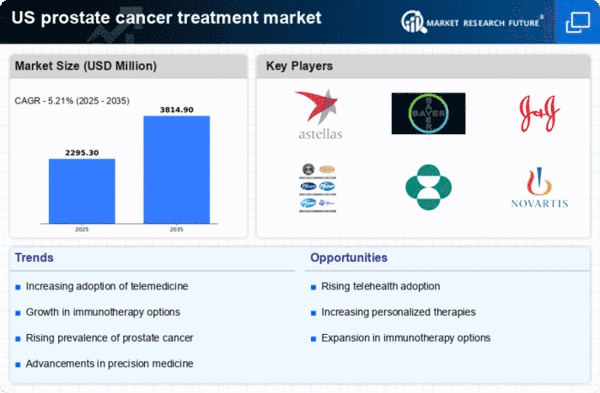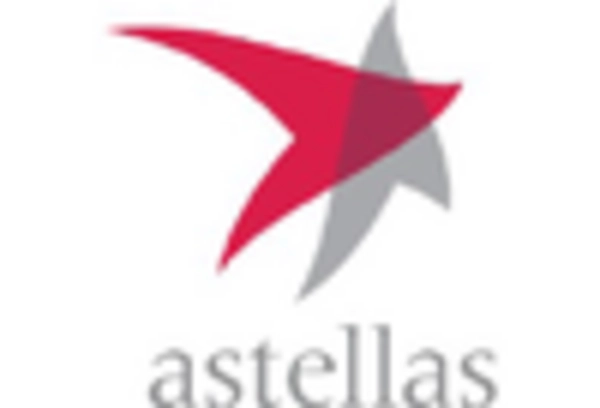Emergence of Personalized Medicine
The prostate cancer-treatment market is increasingly shaped by the emergence of personalized medicine, which tailors treatment strategies to individual patient profiles. Advances in genomics and molecular biology enable healthcare providers to identify specific genetic mutations associated with prostate cancer, allowing for more targeted therapies. This approach not only improves treatment efficacy but also minimizes adverse effects, enhancing the overall patient experience. The market for personalized medicine in oncology is projected to grow at a CAGR of 10% through 2028, indicating a strong trend towards individualized treatment plans. As more healthcare providers adopt personalized medicine practices, the prostate cancer-treatment market is likely to expand, reflecting a shift towards more effective and patient-centered care.
Rising Incidence of Prostate Cancer
The prostate cancer-treatment market is significantly influenced by the rising incidence of prostate cancer among men in the United States. According to the American Cancer Society, approximately 1 in 8 men will be diagnosed with prostate cancer during their lifetime. This increasing prevalence is driving demand for various treatment options, including surgery, radiation therapy, and hormone therapy. The market is projected to reach a valuation of $20 billion by 2026, reflecting the urgent need for effective treatment solutions. As awareness of prostate cancer grows, coupled with improved screening practices, the number of diagnosed cases is expected to rise, further propelling the prostate cancer-treatment market. This trend underscores the necessity for ongoing research and development in treatment modalities to address the needs of an expanding patient population.
Advancements in Diagnostic Technologies
The prostate cancer-treatment market is experiencing a notable shift due to advancements in diagnostic technologies. Innovations such as MRI-targeted biopsies and liquid biopsies enhance the accuracy of prostate cancer detection. These technologies allow for earlier diagnosis, which is crucial for effective treatment. The market for diagnostic imaging is projected to grow at a CAGR of approximately 8% through 2027, indicating a robust demand for improved diagnostic tools. Enhanced diagnostic capabilities not only facilitate timely interventions but also contribute to personalized treatment plans, thereby improving patient outcomes. As a result, the integration of advanced diagnostic technologies is likely to drive growth in the prostate cancer-treatment market, as healthcare providers increasingly adopt these tools to optimize patient care.
Increased Investment in Cancer Research
The prostate cancer-treatment market is benefiting from increased investment in cancer research, which is crucial for developing new therapies and improving existing treatment options. Government funding and private sector investments are on the rise, with the National Cancer Institute allocating over $5 billion annually for cancer research initiatives. This financial support fosters innovation in treatment approaches, including targeted therapies and immunotherapies. As new findings emerge from research, they are likely to translate into more effective treatment protocols, enhancing patient outcomes. The influx of capital into cancer research not only stimulates advancements in the prostate cancer-treatment market but also encourages collaboration between academic institutions and pharmaceutical companies, potentially leading to breakthroughs in treatment.
Growing Awareness and Education Initiatives
The prostate cancer-treatment market is experiencing growth due to increasing awareness and education initiatives aimed at men regarding prostate health. Campaigns by organizations such as the Prostate Cancer Foundation are instrumental in disseminating information about risk factors, screening, and treatment options. As awareness rises, more men are seeking medical advice and screening, leading to earlier detection and treatment. This trend is reflected in the increased number of prostate-specific antigen (PSA) tests conducted annually, which has seen a rise of approximately 15% over the past five years. Enhanced public knowledge about prostate cancer is likely to drive demand for treatment options, thereby positively impacting the prostate cancer-treatment market.
















